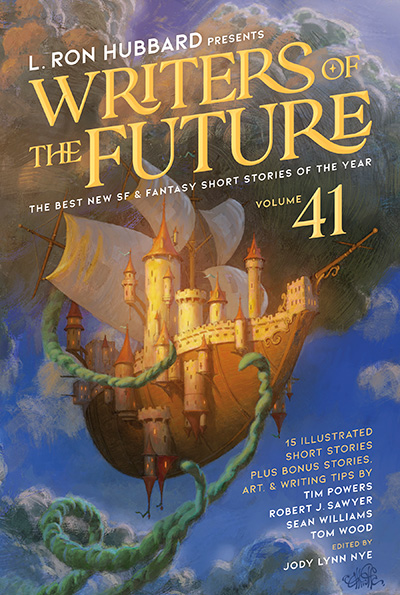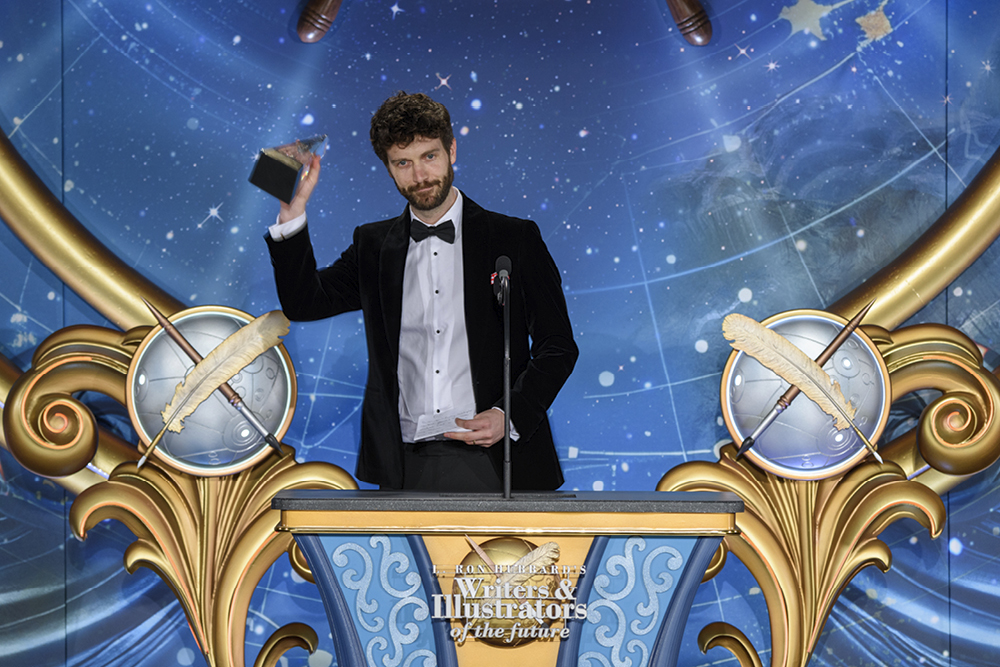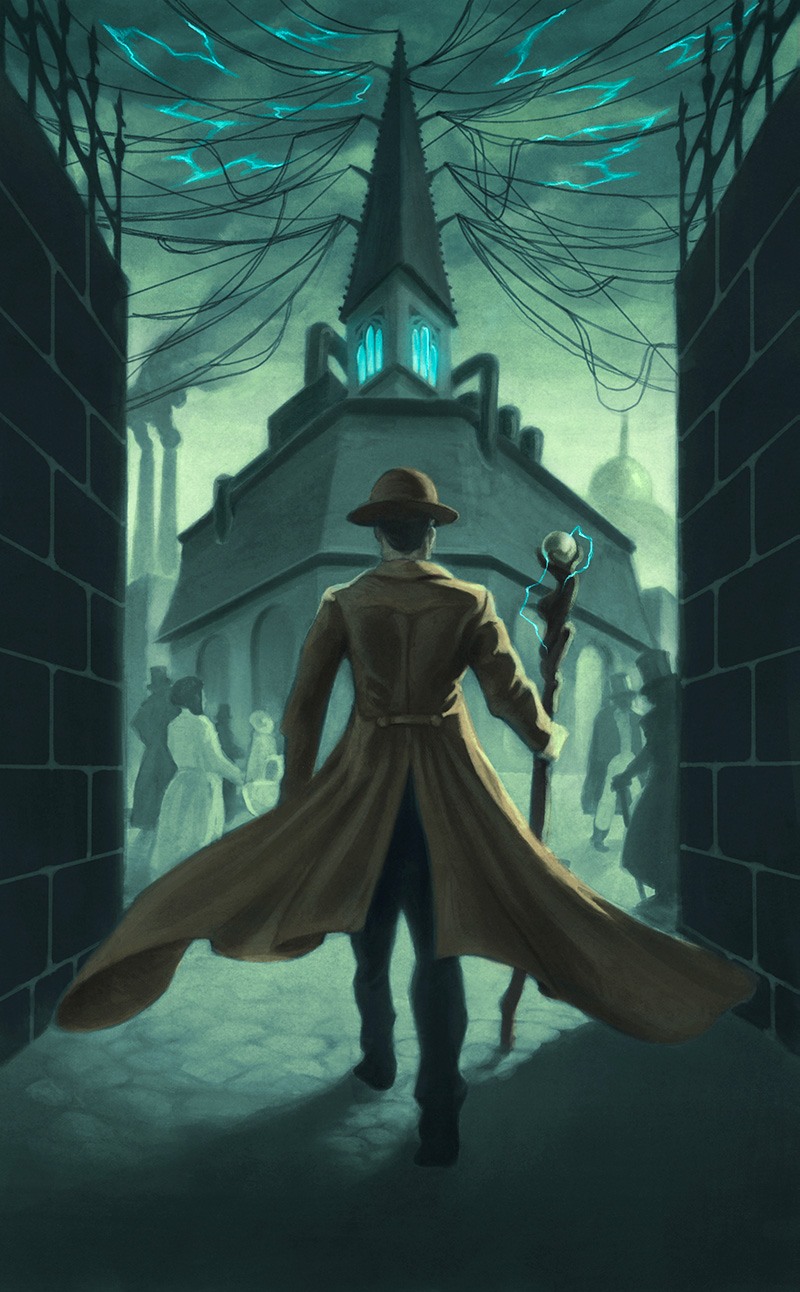“It’s alive! It’s alive!” Taking the Spark of an Idea to Bring to Life a Writers of the Future Winning Story
 After my story, “The Stench of Freedom,” was published in L. Ron Hubbard Presents Writers of the Future Volume 41, the most common question I was asked (after “where do you find the time to write with two young children and a full-time job?”) was: “where did you get that idea from?” This is a common question for writers but I hadn’t really thought about it a great deal before winning the Writers of the Future Contest; mostly because no one had asked me!
After my story, “The Stench of Freedom,” was published in L. Ron Hubbard Presents Writers of the Future Volume 41, the most common question I was asked (after “where do you find the time to write with two young children and a full-time job?”) was: “where did you get that idea from?” This is a common question for writers but I hadn’t really thought about it a great deal before winning the Writers of the Future Contest; mostly because no one had asked me!
Ideas for stories come to me in different ways and when I least expect it—a random image in my head as I’m daydreaming, a quirky story in the local news, an obscure but fascinating event from history, an unexpected conversation with a stranger. Any of these can give me a little spark to want to write a story, a feeling of “ooohhhh, that could be interesting.” But you need more than an idea to actually write a story; you need an interesting setting with a compelling character and a struggle that resonates with readers. That is when a story comes to life. And I’m going to take you through how I went from that spark of excitement to a living breathing Writers of the Future winning story.
Finding the bones of a story
One day this vivid image jolted into my head of a person strapped to a chair getting struck by lightning from ink black clouds. The image was so strong and so dynamic and this thrill of excitement ran through me and I knew I had to write a story involving that scene. But my next thought was, how could I get a story from that idea?
I started by asking myself a lot of questions: why was that person in the chair? What purpose did the lightning serve—punishment or power? Were they controlling the lightning (and how—magic? technology?) or was someone else? If someone was controlling them, were they another magic user and if so, what type of magic were they using? With each answer that image expanded, it became sharper in focus, and it felt like I was journeying deeper into a new world, discovering friends and foes and cultures and creeds.
I am from Wales in the United Kingdom and the Industrial Revolution played a significant part in our modern history and culture.It was a dynamic time of technological progress but also great social upheaval and inequality, with political activism for better working conditions and legal rights due to rampant exploitation. It seemed to me like a setting that is not commonly used in fantasy but one which was full of potential.
I drew on this heritage to create Inglebad, a fog-shrouded city reminiscent of Victorian London, capital of a society that had undergone an Industrial Revolution driven by elemental magic, where Sparkies (magic users that can summon lightning) are exploited by the Earthers’ Guild (a powerful organization of magic users that control the element, Earth) to provide electricity for factories and housing etc. In my story, the Earthers’ Guild capture and exploit Sparkies under the guise of public good; Sparkies are dangerous and dehumanised, they are othered and seen as mere tools to help power the progress of technological change and commercial success, a suffering of the few to benefit the many. Depending on who you are, Inglebad is either a technologically advanced city of opportunity or a dystopian nightmare of oppression.
However, a setting alone isn’t a story, no matter how interesting. To that interesting setting, you must add compelling characters that draw the reader in.
Adding the flesh to the bones
This got me thinking about what kind of person would (and could) subject another human to that level of exploitation and suffering and how would they justify their actions.I didn’t want a moustache-twirling pantomime villain who was evil for evil’s sake. I wanted characters that were more complex, that (to the reader’s eyes) acted awfully but, in the character’s mind, were justified in doing so, who in fact viewed themselves as the heroes of the story.
Rather than tell the story of someone who was already opposing the Earthers’ Guild (such as a Sparky or a member of the resistance group, the Undergrid), I wanted to tell the story of an Earther that came to rebel against, and oppose, the system they once served. This led to Hywel Arfon, a high-ranking Earther who believes he is acting for the greater good of society by shackling dangerous elementals. Throw in personal ambition, in Hywel’s case, climbing the career ladder and maintaining his status in society, and I felt I had someone who, while maybe not likeable, was compelling and had (in their mind) valid reasons and justification for their previous actions. Readers need to believe that the character themselves believe in what they are doing, otherwise they can come across a little wooden or stilted. That’s why it’s so important that the writer fleshes out why a character behaves in that way, rather than just acting like that for plot convenience.
The next thing a protagonist needs is an antagonist. When you think of great leading characters there is always an equally compelling (if not more so) villain; think Luke Skywalker and Darth Vader, Ellen Ripley and the Alien, or Frodo Baggins and Gollum. Given that I already had a morally questionable leading character, for the antagonist I wanted to create someone who, as well as sharing the same worldview as Hywel Arfon, had a reason to dislike and oppose Hywel. In Clarence Rochester, I leaned into personal ambition and competition, a man who was continually second best to Hywel, a man who thought he was the better Earther but was wrongfully overlooked. Most of us have suffered disappointment in our lives, missed out on opportunities we think we should have received but lost out to another. Bitterness and jealousy are powerful motivators, as is maintaining loyalty to an organization and casting out defectors, all of which give Rochester a convincing justification for opposing Hywel.
Discovering the heart of the story
The stories that stick with me are the ones that have a powerful theme or character arc, that leave me thinking about the moral implications or character growth long after I finish reading. Those are the kind of stories that make readers care, that keep readers turning onto the next page instead of going to bed.
With “The Stench of Freedom,” I wanted to take the reader on a character journey that explored a moral awakening, where a bad person tried to become good and to consider if it is ever too late for redemption. As I had set up Hywel Arfon as a pretty rotten character, I needed a powerful motivation to trigger that awakening and begin that path toward redemption. Not only that, but it is also an event that makes the reader care about Hywel and want him to succeed, especially as he is such an unlikeable person at the start.
A moment of profound transformation occurred in my life when I became a parent. Suddenly, I saw the world differently. Now, I prioritize what is best for my children who are the most important things in my life—and I’d do anything to keep them from harm. The beauty of speculative fiction is that it allows you to take this idea to the extreme, to really have fun with how it can change people. And I saw becoming a parent as the significant event that could plausibly make a character like Hywel stop and reflect on who and what he really was and to try and change.
Hywel’s moment of transformation comes when he discovers his newborn son is a Sparky. Suddenly, he is filled with an overwhelming love for his son but is torn between his legal duty to turn his son over to the Earthers’ Guild, or face the consequences of non-compliance; in his case, likely execution. Hywel is faced with a choice between obedience to the system he serves, or fighting to save his son’s life. I hope Hywel’s journey leaves questions in the reader’s mind about how people can be complicit with unjust systems, what could make them change their worldview, and whether it is ever too late to atone for what you have done in the past.
This struggle to be a better person, fueled by the primal need to protect his child, is the beating heart of “The Stench of Freedom” and I think it was what elevated my story from being a cool idea story to a Writers of the Future winning story.
Joel C. Scoberg lives with his very supportive wife and somewhat feral children on the Gower Peninsula in the UK. He is a winner of the Writers of the Future Contest (Volume 41) and his stories have also appeared in Daily Science Fiction, 365tomorrows, and Gwyllion Magazine among others. To peek further into his imagination, visit www.joelcscoberg.com.






Leave a Reply
Want to join the discussion?Feel free to contribute!